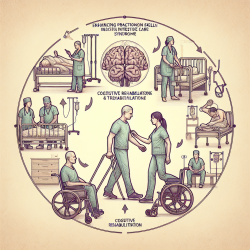Fibromyalgia (FM) is a chronic condition characterized by widespread musculoskeletal pain, fatigue, and cognitive disturbances. Despite its prevalence, it remains a complex and often misunderstood disease. A recent qualitative study titled "Dealing with fibromyalgia in the family context: a qualitative description study" sheds light on how FM affects family life and provides valuable insights for practitioners aiming to improve their support for affected families.
The Study's Key Findings
The study involved focus groups with 41 family members of women diagnosed with FM, conducted in community health centers in Valencia, Spain. The researchers identified four major themes:
- Fibromyalgia as a Nosological Entity or an Invention: Family members held differing views on the legitimacy of FM as a disease, impacting their support and understanding.
- Children and Spouses as Caregivers: The study highlighted the varying roles of family members in caregiving and the emotional burden they face.
- Adverse Effects on Sexual Life: FM significantly affected couples' sexual relationships, often leading to feelings of guilt and frustration.
- Economic Consequences: The financial impact on families was profound, with many patients unable to work or requiring costly treatments.
Implications for Practitioners
This study offers several implications for practitioners working with families affected by FM:
1. Enhancing Understanding and Acceptance
Practitioners can play a crucial role in educating families about FM's legitimacy as a medical condition. By fostering understanding and acceptance, they can help alleviate tensions and improve familial support structures.
2. Supporting Caregiver Roles
The study underscores the need for practitioners to acknowledge the diverse caregiving roles within families. Providing resources and support for caregivers can help mitigate their emotional burden and promote healthier family dynamics.
3. Addressing Sexual Health Concerns
Practitioners should be prepared to discuss the impact of FM on sexual health openly. Offering counseling or referrals to specialists can help couples navigate these challenges constructively.
4. Mitigating Economic Strain
The financial toll of FM is significant. Practitioners can assist families by connecting them with financial resources or advocating for workplace accommodations that allow patients to remain employed where possible.
The Need for Further Research
This study highlights gaps in our understanding of FM's impact on family life. Further research is needed to explore these dynamics across different cultural contexts and to develop targeted interventions that address the unique challenges faced by families living with FM.
The insights gained from this research are invaluable for practitioners seeking to enhance their skills in supporting families affected by fibromyalgia. By implementing these findings into practice, professionals can contribute to improved quality of life for both patients and their families.
To read the original research paper, please follow this link: Dealing with fibromyalgia in the family context: a qualitative description study.










